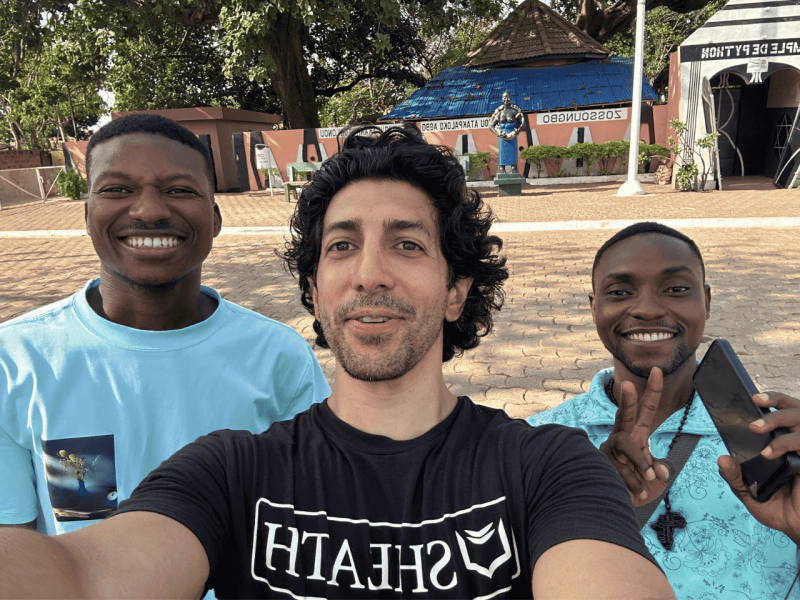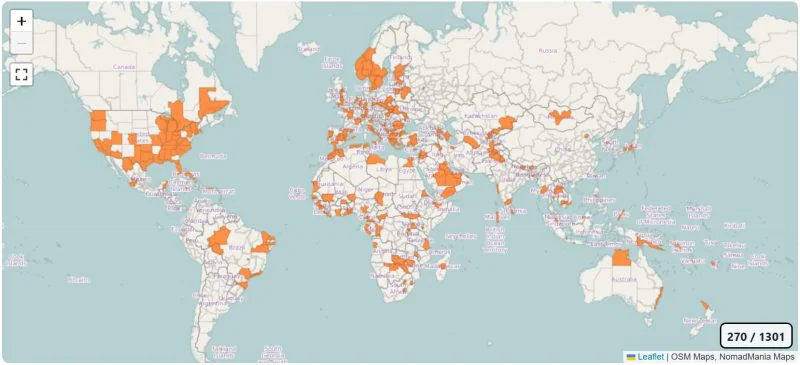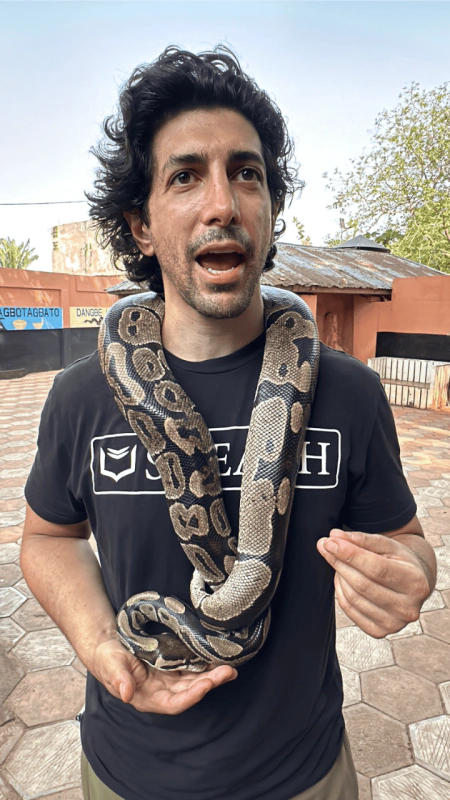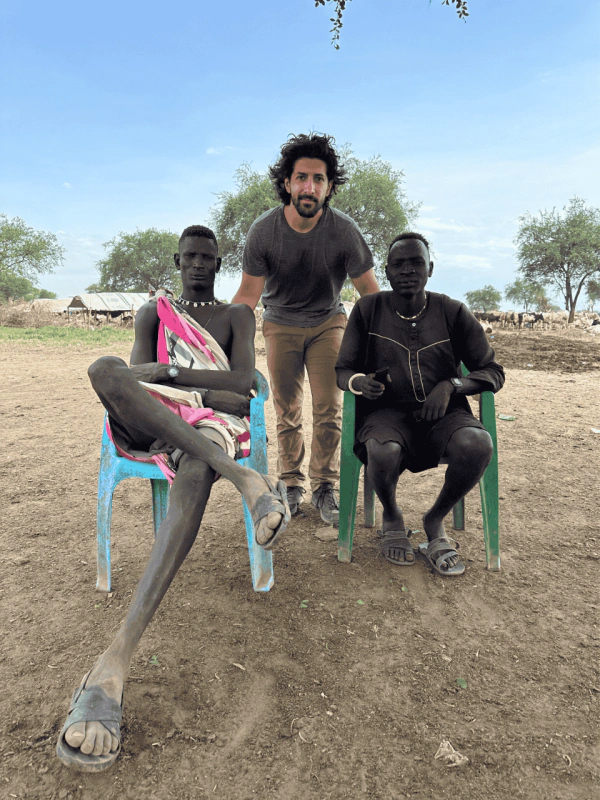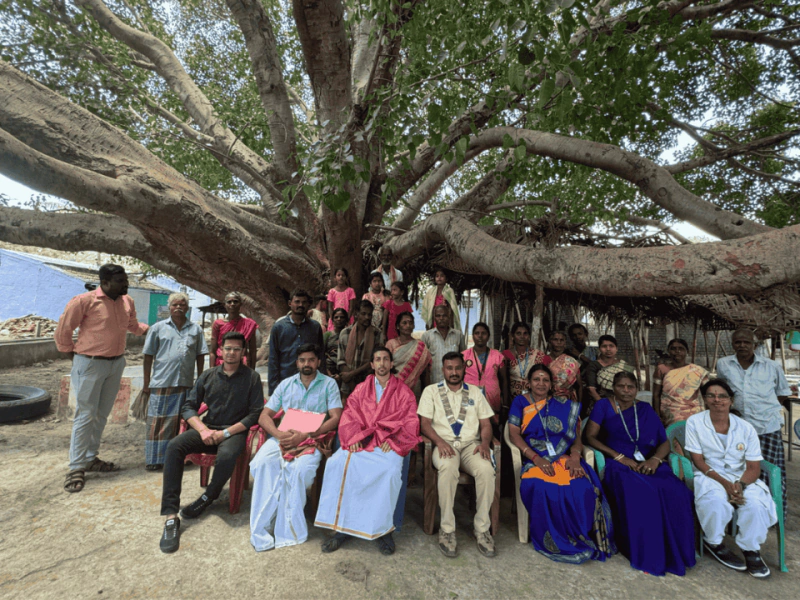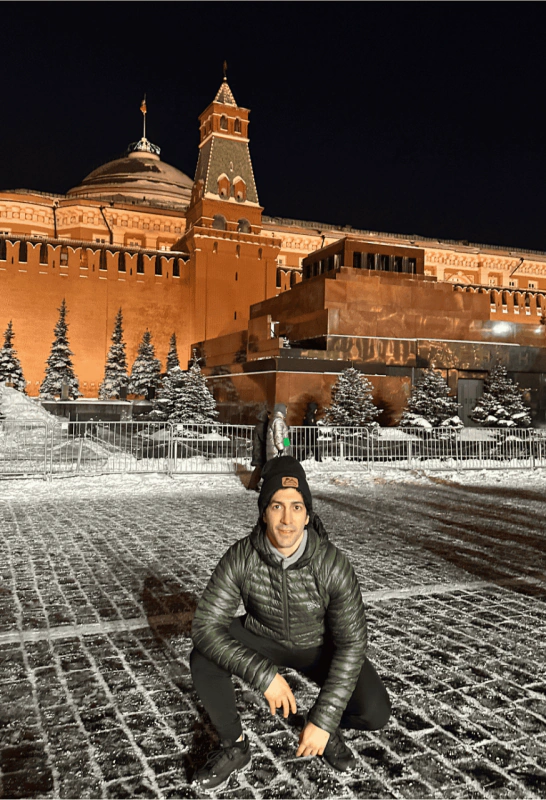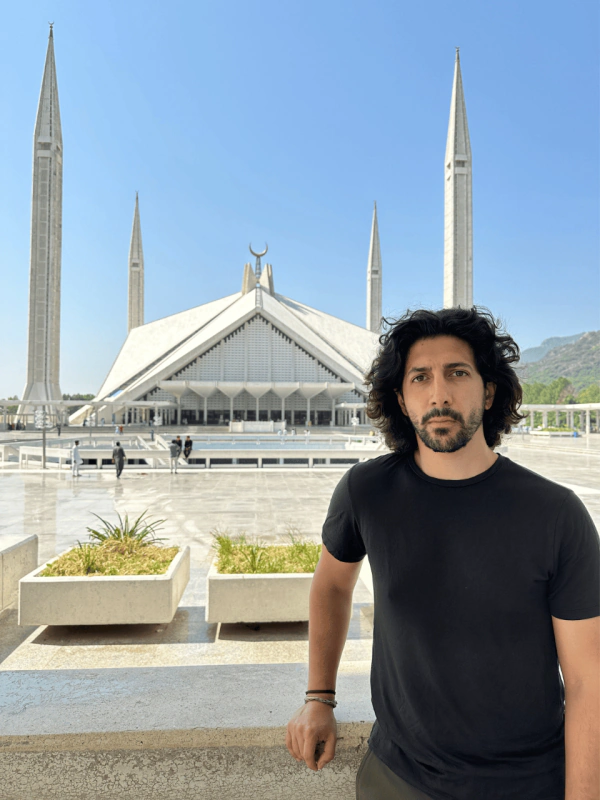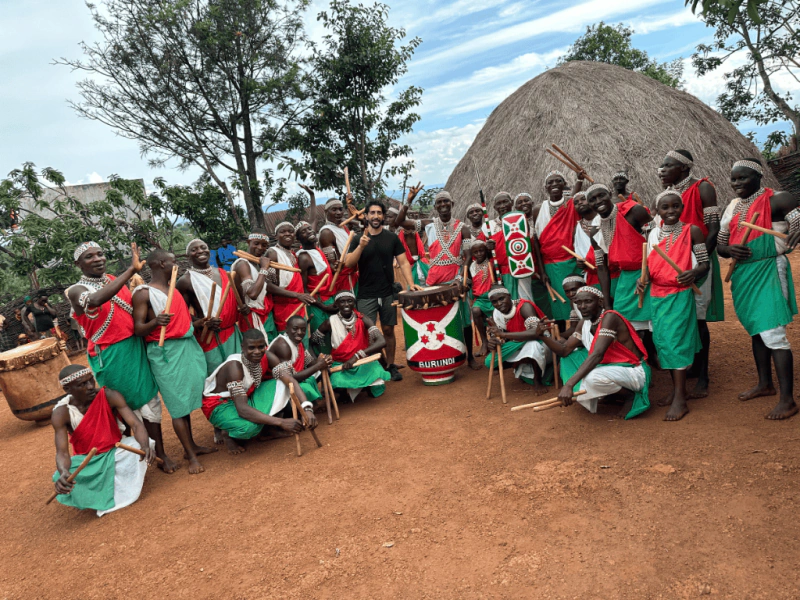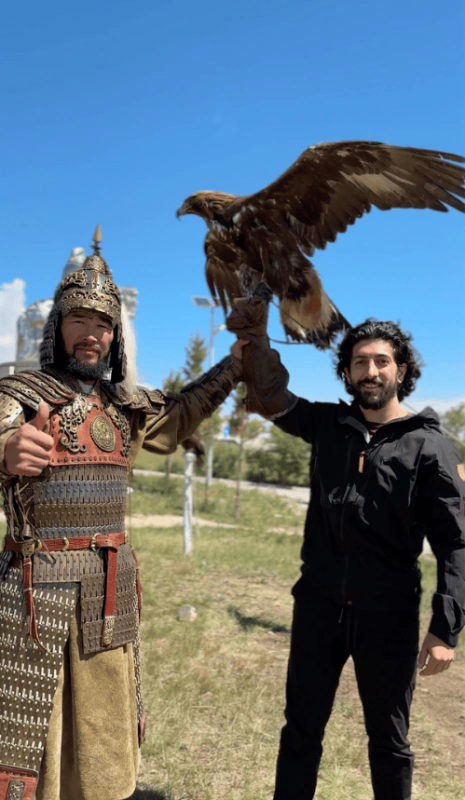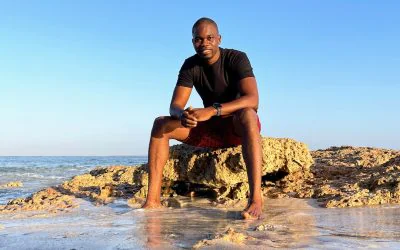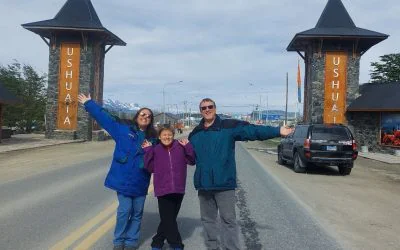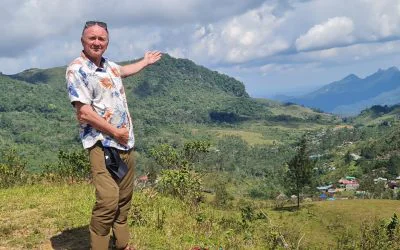Michael, a dual citizen of the United States and Greece, embodies this mission with his ambitious endeavor: Project Kosmos. This unique project is more than a quest to visit every UN-recognized country faster than anyone before – it’s a journey of collecting stories, understanding happiness across cultures, and redefining what it means to connect with the world.
In this interview, Michael shares his motivations, the challenges of balancing speed with meaningful experiences, and the profound insights he’s gained from asking people around the world one simple yet powerful question:
What is the happiest moment of your life?
Check Michael’s impressive map of the countries and regions he has covered so far through his NomadMania map:
Join us as we delve into the heart of Project Kosmos and Michael’s goal to break the world record by visiting all countries in the shortest time possible.
Opening question: Please introduce yourself the way you love people to know you?
My name is Michael, and I am a dual citizen of the US and Greece, though I grew up in the States. I’ve been many things in my life, but currently, you can just call me a storyteller. I am a curious person, and that is at once my greatest strength and my greatest weakness, which makes for a fun life. Though maybe not a long one.
What inspired you to embark on the mission to visit every country in the world, and what does breaking the world record mean to you personally?
Visiting every UN nation was never something on a to-do list growing up or in my adulthood. Sure, I had been to many places before embarking on this quest and enjoyed traveling as a means to an end of learning. Strangely, I do remember once standing on the apartment balcony of my acquaintance, emotionally musing to her that I would never visit every country in the world. That there were just too many places to see and not enough time the way I was living my life. A couple of years later, that is exactly what I did.
But visiting every country is a function of collecting stories during what I call Project Kosmos. Breaking this record is a personal challenge to Michael, The Thrill-Seeker, rather than an interesting project to Michael, The Storyteller, or The Traveller. I admit I like that it forces me to engage physically, emotionally, and intellectually with the immediacy of the world around me.
Every day I need to be fully in the present so that I absorb each and every detail I inevitably come into contact with (read: collide with). However, I’m fully aware of the nature of records and how someone always comes along to try to break yours. Even if I have full intention to break it, I’m not attached to the achievement as a definitive aspect of my being.
Project Kosmos is more than just a race to visit countries, it’s a journey that includes asking people about the happiest moment of their lives. Why did you choose this question, and what do you hope to discover through their answers?
I’m glad you asked this. If it was merely a race around the world, I would find it rather dull, and I would’ve approached the trip in an entirely different way. The second part of my trip is, in fact, the most important part of it. It’s the thing that will last longer than any record I break, way after it’s become some awful endurance race to see who can spend time on a plane the longest.
Asking people about the happiest moment of their lives is an attempt to curate stories from around the world that can teach, inspire, and encourage young people that happiness is possible, whoever you are, wherever you are. I think it’s important to get answers that can give you an idea of who a person is, the fundamental experience of happiness, and a tiny taste of the culture.
You’ll be traveling at an unprecedented pace. How do you balance speed with the depth of experience in each country, especially when interacting with locals?
Yes, this is the crux of what I alluded to in your previous question. I could, if I wanted to, land in an airport, get my necessary evidence, and leave. That sounds dreadful. Instead, I knew what the record was, backtimed the necessary time to beat it by a significant margin, and then distributed the necessary days across different locations.
There were some times, and in some countries, where flight schedules don’t permit me to stay as long as I would wish. In all circumstances, except for perhaps my upcoming visit to Vatican City, I will have stayed at least a night.
In most countries, I stay for several days. I don’t always know exactly how much time I need to sniff out stories, but for those countries I’m in for shorter amounts of time, I am much more aggressive about seeking people ahead of time as an avenue for a deeper experience.
What has been the most challenging part of preparing for such an ambitious and fast-paced journey?
I actually find the planning and execution to break the record much simpler than actually finding people willing to be interviewed on camera about happiness. There are many countries where cameras and social media are looked upon with a little more scrutiny.
It can also be a personal subject for people. Some regions have been like pulling teeth to get people on camera, but so far, I haven’t failed. I may not get as many in some as I do in others, but I need to forgive myself and not dwell on it too much. I am a one-man band, after all.
How do you envision Project Kosmos impacting the way people view world travel, cultural exploration, and global citizenship?
I have said this many times before, but if just one story impacts a person in the world, changes their perspective, or makes them think about their own circumstances, I will have done what I set out to do. Any other effects are ancillary.
I do not think traveling quickly is a very good way to go under normal circumstances and for most people trying to “know” a country or develop relationships. So, I hope I can instead feed a little curiosity to people about a country I’ve been to in order to inspire them to visit more deeply. I know I will be doing that on my second lap.
What are some of the most profound lessons you’ve learned about happiness from the people you’ve already met on your travels?
I believe it is true that happiness is found everywhere and anywhere. I have met some who have said they’ve never experienced happiness, though usually they’ll admit to something as I talk with them more. As a courtesy, I never pressure them further about it, but I do suspect everyone has experienced it too. Some just aren’t in a mindset to talk about it.
Another observation I find important is that “what” makes a certain person happy (family, success, money, religion) may not be the “happiest moment of their life”. In fact, these two things do not usually correspond. Let’s say Mohommed reports that what makes him happy is being a valuable member of his community. However, he says that his happiest moment was when he took hajj to Mecca. These two aren’t related, nor are they in contradiction to one another.
I refer to it as the topography of happiness in one’s life. In other words, the mountains and valleys can exist in radical isolation to the rest of the environment of someone’s happiness. To know what makes you normally happy, and then to be open to the excitement of life so to generate memories of great happiness, are two different and compatible ways of living. I also think it’s extremely important to distinguish the idea of “joy” or “ikigai”, that is the long-term experience of fulfillment or purpose, with happiness, which can be as brief as a delicious meal or a music concert. Maybe that’s a topic for a different day though.
There are only 600 people in history who have visited every country. How does this rare achievement shapeyour perspective on the importance of travel in shaping a person’s life and worldview?
Ask me once again after I visit all of them.
What’s the most surprising thing you’ve learned about the world so far, especially in terms of human connection and the universality of happiness?
While I’m never really surprised anymore at the depravity of humans, I continue to be amazed and grateful for their generosity, especially on an individual basis. Coming from a very hospitality-driven culture like Greece, I am surprised that so many very, very different countries and cultures match and exceed this same level we like to give guests. I am also surprised that so many people were able to conjure their happiest moments right on the spot! I recognize it’s not an easy question and sometimes, I don’t give them a lot of time the way I encounter people.
Traveling to every country means encountering a wide variety of cultures, traditions, and ways of life. How do you prepare yourself to adapt to such diverse environments?
I try not to learn too much about a country before I visit, because I do not want something to bias my perspective. In essence, I approach each country with what I call “childlike wonderment”. I ask many questions, treat people with respect, and “do as the Romans do”. I can’t think of a time where I’ve been asked to do or try something where I’ve said “no”. I’ll let you use your imagination.
Nomadmania values not just the number of countries visited, but the experiences shared in each destination as we know you do as well. How do you ensure that your experiences in each country leave a meaningful impact, both on you and the people you meet?
I do not believe you should be worried about “what” you see but rather “who” you see. People are your door into their world, not monuments, buildings, or even the natural environment. The kinds of things I’ve done with the locals are not found in guidebooks because they are not “standardized” like a tour. On that point, I do not like this idea of criticizing others for not seeing this or that, as if to say you haven’t seen a country if you haven’t seen it.
The experiences of others are not the same as yours and something fundamentally powerful for one person could be an afterthought for you. When I embrace a person to say goodbye and leave their country, it is with certainty that I won’t be able to replicate the experience again, even when I return.
Nomadmania is a platform that celebrates travel and the exploration of the world. What does it mean to you to be part of a global community of explorers, and how does Project Kosmos align with Nomadmania’s mission?
I’ll be frank, before I began planning my trip, I didn’t know there were people called extreme travelers or those “chasing 193.” Nomadmania, as well as other travel groups, are fairly new to me and I am not deeply aware of the mission. It would be a lie to say I have been a member of “the community.” But what I do know about it is that it celebrates sharing knowledge, many ways of life, and a general acceptance of the other. I like these qualities.
Those who associate themselves with Nomadmania have shared their knowledge with me and given me ideas and introductions in a way that I wouldn’t have had otherwise. As to how Project Kosmos aligns with Nomadmania, I might suggest that my project is deeply human-centric. I want to treat people well and give those in different countries a way to express themselves. It’s nice to know that some have become more curious about meeting others as a result of my project.
As you began your journey in 2024, what are you most excited about experiencing in the next few years, and what would you say to those who aspire to travel the world but are unsure of where to begin?
I am already a year into my journey, meaning I have more behind me than in front of me at this point. There have been many countries I wanted to go to that now I have, but I wish now to go to a second time with more depth.
What excites me still is being surprised and being proven wrong about the world (I hope in a positive way). I would say to them this: pick a place on the map, preferably at random, and promise yourself you’ll go within the year. Go by yourself, or if you are extremely uncomfortable with this idea, find a friend to go with you. But remember, travel, just like growth, is uncomfortable. Not everything will go exactly as you planned, and that’s ok.
P.S. Make sure to follow Michael on Instagram
